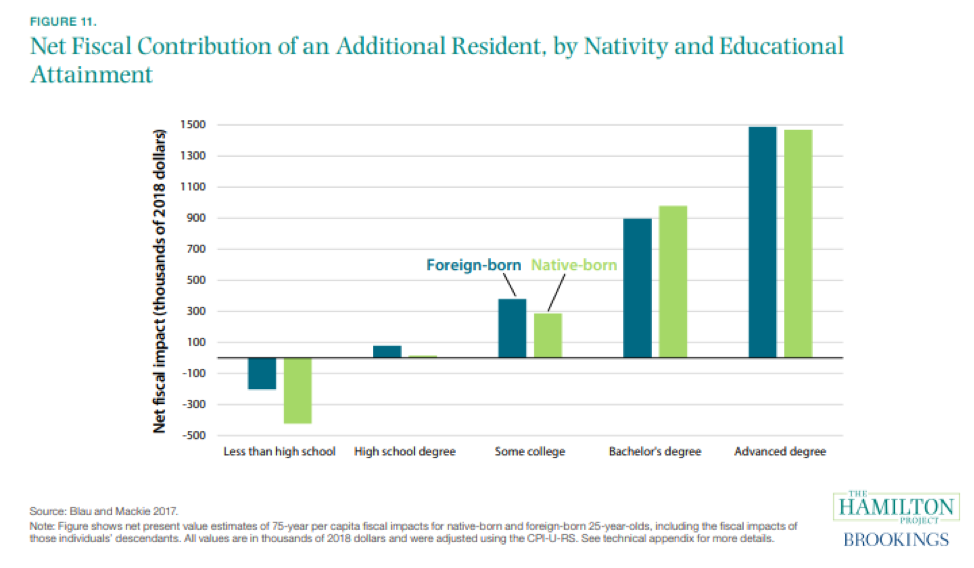In the era of President Donald Trump, inflammatory rhetoric about immigrants flows fast and free. And in the midst of tight mid-term elections, the Republican Party has largely abandoned campaign messages focused on tax cuts and the economy in favor of divisive (and misleading) advertisements suggesting that Democratic candidates support terrorists, or want to throw open America’s borders to violent criminals. Underlying many of these ads is a narrative popularized by the president, one in which immigrants pose both a physical and economic threat to native-born Americans.
In a report released Tuesday by The Hamilton Project, a research group within the centrist Brookings Institution, authors Ryan Nunn, Jimmy O’Donnell, and Jay Shambaugh examine this oft-debated narrative. Looking at the demographics and characteristics of immigrants in the United States, and the effects of immigration on crime and economic outcomes, they find little support for the idea that immigrants are ruining native-born Americans’ job prospects or driving up crime rates.
Below, three facts from the report about U.S. immigrants that run counter to the damaging assertions being made on airwaves:
The Effects of Immigrants on the Wages of Native-Born Americans Are Debated
There’s a long-running debate over whether increased immigration depresses wages for native-born Americans. Economists have generally found that immigrants increase wages of native-born workers with higher levels of education.
However, economists have also found somewhat mixed effects of immigration on the wages of less skilled U.S. workers: Some studies have found that low-skilled immigrants slightly decrease the wages of low-skilled, native-born Americans (by between 0 and 1 percent), while others have found a positive effect. The Hamilton Project researchers conclude that “most estimates find the overall impact on native workers is positive.”
Immigrants Increase Economic Growth and Contribute to Government Coffers
Less controversial is the effect of immigration on economic growth. Economists across the political spectrum generally agree that immigration increases both economic output and economic growth rates. High-skilled immigrants also significantly increase innovation in the U.S.; according to the Hamilton Project researchers, economists have found that “[a] one percentage point increase in the college-educated or advanced degree-holding immigrant shares of the U.S. population are estimated to produce a 12.3 percent or 27 percent increase in patenting per capita, respectively.”
There is also little support for the oft-repeated claim that immigrants are sucking the U.S. dry due to their disproportionate use of social safety net programs. As the chart below illustrates, immigrants across almost every education category have a more positive fiscal impact than native-born Americans:

(It’s also worth noting here that only immigrants with less than a high school degree have a negative fiscal impact.) What’s more, while this report looks only at fiscal contributions of first-generation immigrants, economists have found that the children of immigrants are more likely to complete college, and less likely to live in poverty, than native-born Americans (and are thus likely to make positive fiscal contributions). A 2017 report from the National Academies concluded that, after accounting for an immigrant’s descendants, each additional immigrant has a long-term fiscal contribution of $173,000–$259,000 over 75 years.
Immigration Doesn’t Increase Crime
Immigrants to the U.S. are less likely than native-born citizens to be arrested, charged with a crime, convicted of a crime or felony, incarcerated, or institutionalized. This is true even when researchers examine only a brief window of time. The Hamilton Project researchers cite a 2014 paper, by University of Pennsylvania criminology professor Aaron Chalfin, which found no connection between Mexican immigration and U.S. crime rates. What’s more, researchers have found that providing legal status to undocumented residents actually causes crime to decline.





